
The Lifters successful replications
Experimenters Log Book
created on October 10th, 2001- JLN Labs
All informations in this page are published free and are intended for private/educational purposes and not for commercial applications

The Lifters successful
replications
Experimenters
Log Book
created
on October 10th, 2001- JLN Labs
All informations in this page are published free and
are intended for private/educational purposes and not for
commercial applications
Lifter replications Log Book : Previous Page - Next Page
|
|||||||||
| Envoyé via Internet | |||||||||
Bonjour,
My name is Jaroslaw Binczarowski, I am an engineering student at Sheridan College in Ontario, Canada and I have sucessfully built your lifter on May 31, 2005.
I used a computer monitor, and instead of balsa, I used a foam tray. If possible, I would enjoy being on your registered list (#310)
Keep up the good work!
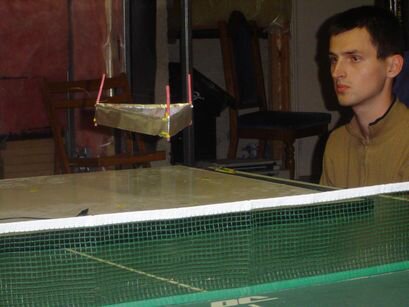
|
|||||||||
| Envoyé via Internet | |||||||||
Bonjour,
Ca y est mon lifter lévite !!! Que d'émotion lorsque je l'ai vu
volé pour la première fois !
Je vous remercie pour votre aide et je prends les
photos demain puis je vous les enverrai.
Merci encore pour tout et je vous ferai parvenir tout mon travil
dès que je l'aurai terminé.
Voilà !
Chose promise, chose dûe , je vous envoie après plusieurs
efforts une photo de mon lifter en lévitation!
Merci encore pour toute votre aide et je vous ferai parveir mon
compte-rendu dès que je l'aurai terminé.
Mes Salutations,
BENZEBIBA Naïm.
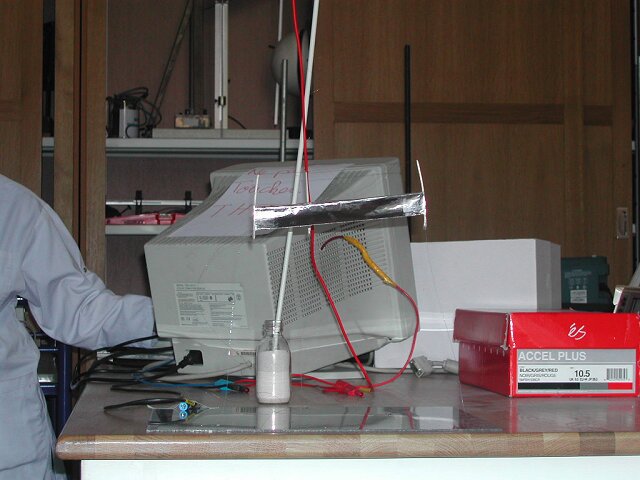
|
|||||||||
| Envoyé via Internet | |||||||||
Dear Naudin,
I hopeyou have room for my pictures of my lifter too. I have never sent you any picture of my lifters before. PS. I need 45 mm between the wire and the aluminumfoil, to prevent arcing.
Regards Svein
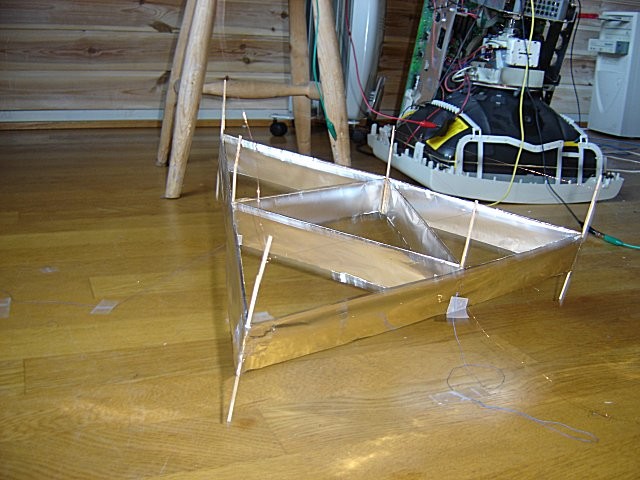
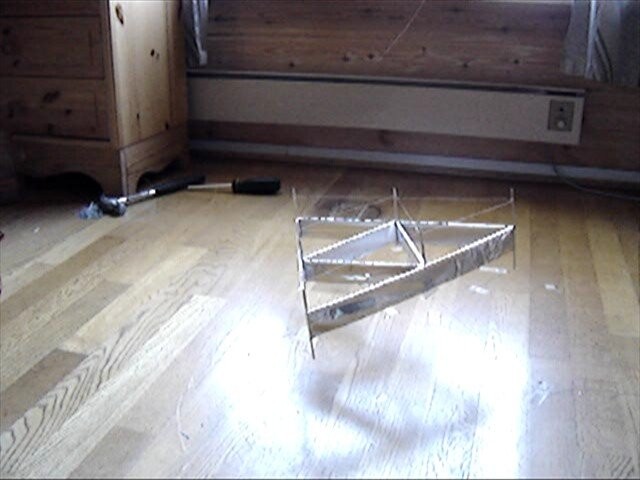
|
|||||||||
| Envoyé via Internet | |||||||||
Bonjour Monsieur Naudin,
Voici les images du vol de ma replique de lifter1 en pièces
attachées à ce message, sachant que je soupçonne mon
generateur de THT d'être un peu faiblard (récup!) ce qui m'a
obligé à reconstruire le module (le premier était construit au
standard aero mais un peu lourd, il se soulevait mais ne volait
pas, le deuxième est quasi immatériel, il porte deux fois son
propre poids, mais je n'ai pas réussi à lui faire adopter un
regime de vol stable).
Meilleures salutations.
Jean-Luc Soullier (Nice, France)
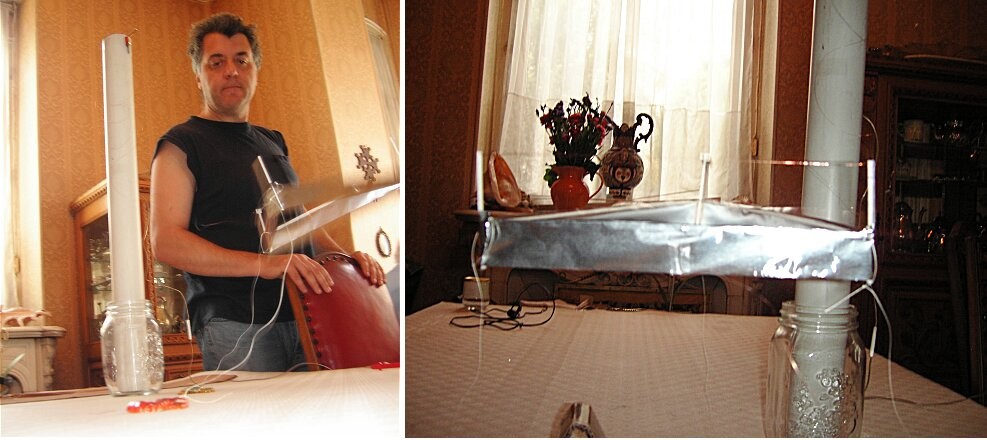
|
|||||||||
| Envoyé via Internet | |||||||||
Hello Jean Louis Naudin.
In the last two weeks I have build 3 different models (triangle), but this one has a stable flight, I called it the "Quattro". I intend now to make the Hexa lifter and will do more experiments with the voltage at AC and DC. I use a variac to regulate the voltage, when the monitor works between 80-130 volt AC input, you can have some effect on the flight. You will hear (see) more if there is.
Greatings,
Bastiaan J Chervet
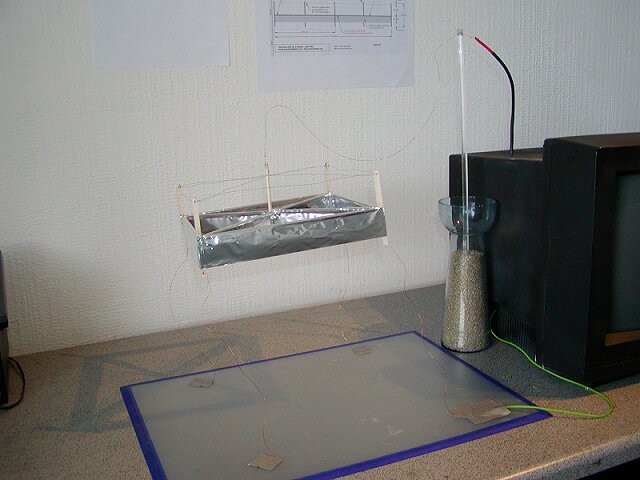
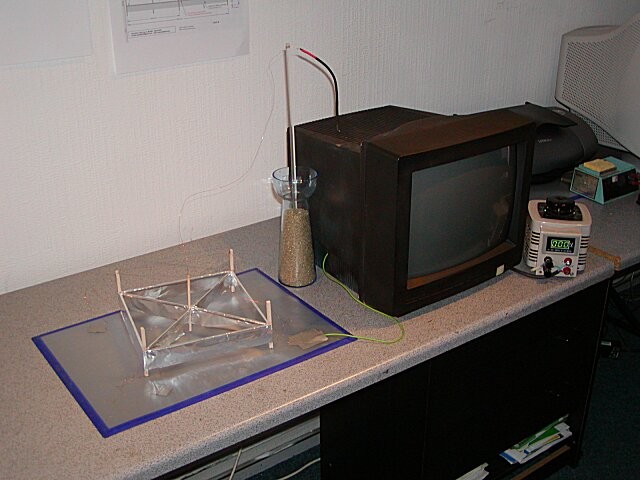
|
|||||||||
| Envoyé via Internet | |||||||||
Merci beaucoup pour l aide et l attention que vous avez porter a la création de notre TPE
ci joint nos vidéos représentant l'évolution du projet , je n ai pu vous fournier le diaporama car la totalité de notre tpe est bcp trop importante pour etre envoyer par email,
merciii et bonne continuation
Barth et Ceri
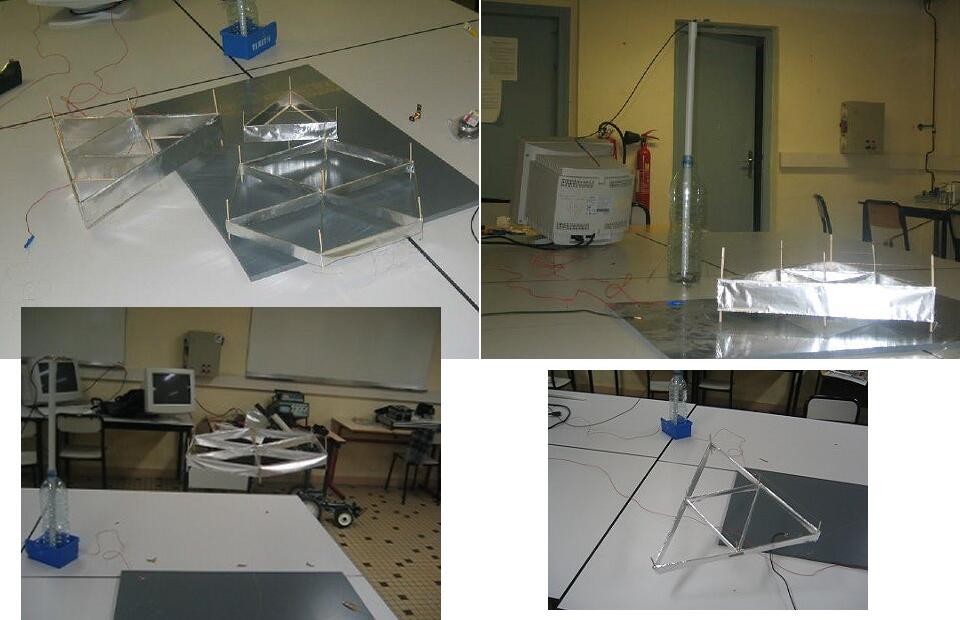
|
|||||||||
| Envoyé via Internet | |||||||||
Hello, Jean-Louis!
Here are three pictures of my lifter in working order.
(One of which features me on the left.) It was thrilling to
experience my first lifter take-off, and I plan to continue my
study of this young scientific field. I have not previously
mentioned that I am 16 years of age, none the less, I am
intensely interested in physics and I plan to make a career of
it. This experience was my first practical use of high voltage,
and I enjoyed every moment! I wish you the best in your studies
and experiments!
Embracing
new horizons,
Davin H. Riedstra
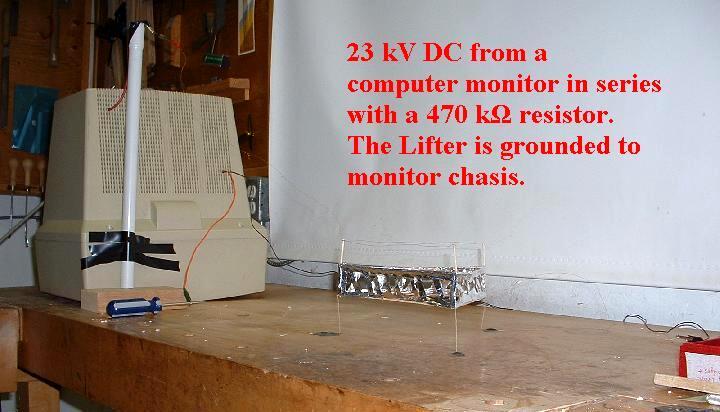
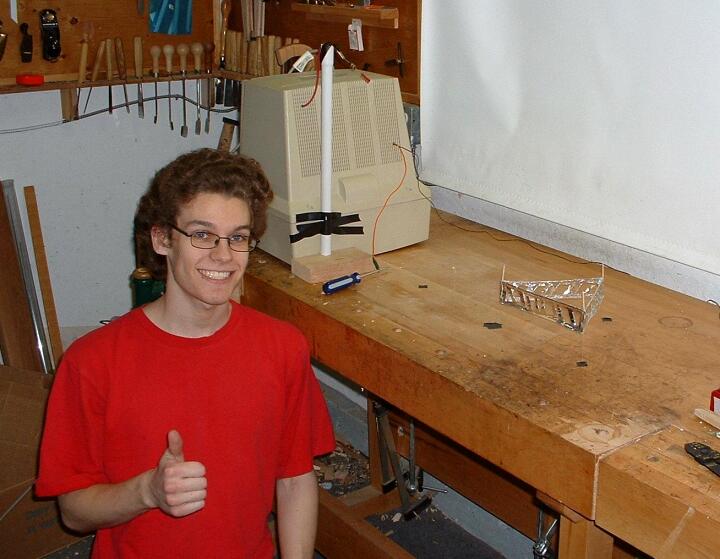
|
|||||||||
| Envoyé via Internet | |||||||||
Dear Jean Louis Naudin,
We have lunched our first lifter 1.0 replication on april 06.
Thanks to your drawings and explanations it was quite easy to
built and to prepare the instalation for the experiment.
Thanks for this exiting experience,
Vitor Carvalho and Luiz Felipe Motta,
From Rio de Janeiro - Brasil.
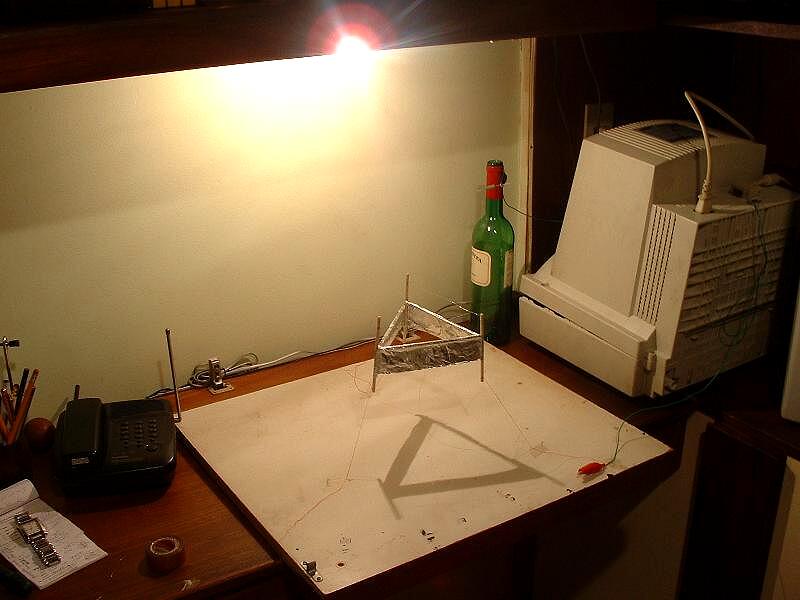
|
|||||||||
| Envoyé via Internet | |||||||||
I have made several successful lifters and I am
now putting them in aquariums to display them safely. I found the
high voltage in the lifter creates a static cling effect so I use
a thin nylon thread as a guide string to keep the lifter from
attaching itself to the glass. Thank you for sharing the plans to
make the lifter.
Thank you,
Eugene Bunt
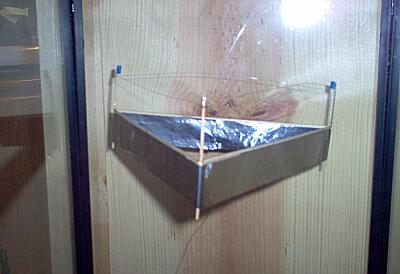
|
|||||||||
| Envoyé via Internet | |||||||||
Hi Jean-Louis,
Today I've successfully finished the Lifter1 experiment !
This is my 2nd Lifter1, though the 1st one failed to fly because of the heavey weight . Now with a lighter material,according to the instructions on your site,the 2nd one's just working well.(see attach)
Thanks you!
Regards,
Sywalt Guo (Beijing,China)
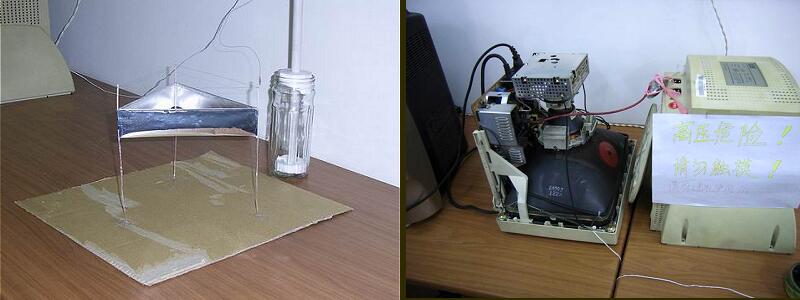
|
|||||||||
| Envoyé via Internet | |||||||||
Cher Mr Naudin,
Depuis que j'ai pris connaissance de la véritable poussée
ascensionnelle des lifters, j'y consacre beaucoup de temps et
cela me passionne. C'est pour cette raison que j'ai décidé
d'essayer d'améliorer les performances des lifters.
Pour cela j'ai réalisé trois autres lifters (car je vous avais
envoyé des photos de lifter v1 et v2) : un petit triangulaire de
10 cm de côté, un hexalifter de 20 cm de côté et un lifter
basique (triangulaire) de 35 cm de côté mais sans armature a
l'inérieur en forme de triangle de sierpinski.
Je vous joins donc mes résultats d'expérimentations :
-le lifter de 10 cm de côté ne vole pas bien car un coin ne
décolle pas. (hauteur de la jupe d'alu : 4 cm), je pense que
j'ai mal pensé cette hauteur de jupe et je suis sur le point
d'en créer un autre.
-l'hexalifter vole bien mais pas très vif au décollage et au
long du vol. De plus il ne vole pas très haut si on allonge les
fils qui le retiennent. (hauteur de la jupe d'alu : 2.5 cm) il
faut dire que je n'avais pas de fil de cuivre et que ce fil
corona (en fer je crois) n'a pas pu être tendu au maximum...
Cela doit jouer sur le vol en plus de mon alimentation THT grâce
a un moniteur de PC qui ne fournit pas assez de puissance je
crois.
-Enfin le meilleur est le lifter de 35 cm de côté ! hauteur de
la jupe d'alu : 2.5 cm, espace jupe/fil corona : 3.8 cm, hauteur
sol/jupe : 4.5 cm. Pour tendre le fil corona j'ai fait un
'deuxieme fil corona' (pas en cuivre : du simple fil de couture !
plus léger !) mais à l'opposé du vrai. cela dans le but
d'avoir une meilleure rigidité en vol et de ne pas trop forcer
sur l'unique point de collage entre les baguettes verticales et
les horizontales (car je n'ai pas mis d'armature de balsa en
bas). Ce lifter semble vouloir "crever le plafond" à
l'instar de celui de Claude Dupré.
->J'ai d'ailleurs constaté que sur vos plans de l'hexalifter,
la hauteur sol/jupe d'alu n'est pas suffisante puisque j'ai
décidé de l'augmenter à 5 cm car il ne volait pas. Cela a
été effectif, et logique compte tenu de la théorie principale
car il faut de l'air en dessous du lifter pour qu'il y ait une
meilleure force ascensionnelle !
Je ne voudrais pas prendre plus de votre temps donc je vous joins
quelques photos qui seront plus explicatives !
Merci de votre attention
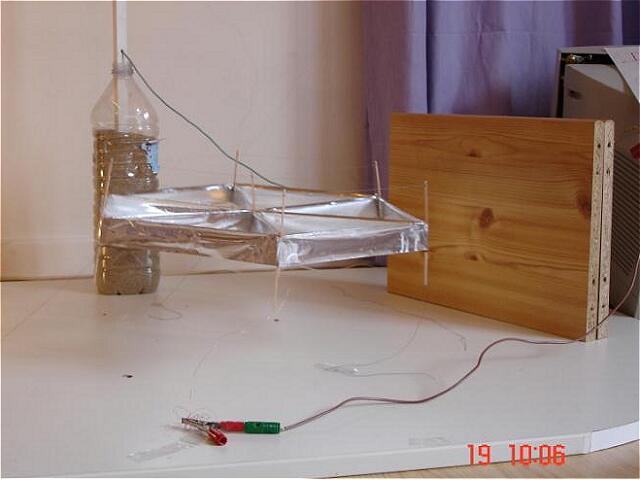
|
|||||||||
| Envoyé via Internet | |||||||||
Hello Jean-Louis Naudin
I am delighted to report the successful flight of
my lifter craft named "Shuttle One". I have been
hoping to be the 300th successful lifter report on your wonderful
web page. Thanks so much to you for your fabulous website. I
study your materials every week, hoping to do more of your
experiments. The lifter in the photo is powered by a 40kV power
supply from AppliedElectrogravitics.com. This little
"shuttle one" lifter flew right away on the first try,
however it was the first
ship I built. My first ship was a "Beamship Variation
I", a kit I purchased which also supplied the power
supply. Unfortunately, since the larger beamship (a triangle
about 1 meter long on each side) was my first construction, I
made some construction errors which prevented my Beamship from
taking off. After some efforts, I decided to downsize the
project based on the smaller original lifters on your website.
My "shuttle one" took off right away with great
success. I was
thrilled!!! For other lifter builders, I would note that it
definitely takes a little experimentation with the placement of
the high voltage + wire above the lifter cells. Also, the
length and precise location of the tether lines is critical to
creating a stable hover flight.
Further, I had originall suspended the main + HV
wire from a flimsy wooden stick in a glass bottle next to the
lifter. I eventually figured out that as the lifter jerked back
and forth on the + HV wire, the flimsy wooden supports were
bouncing back and forth, like a tiny fishing pole....contributing
to the instability of the lifter. I am now going to use thicker
wooden dowels to support my HV line. Another problem that I had
was that the two power leads from my power supply were originally
running about 5 meters away from me (to avoid the low level gamma
radiation from the lifter)... but the HV wires were not coated
with any teflon or other insulation... so the two HV wires were
strongly attracted to one another and over the distance of 5
meters (15 feet) from the power supply, the - HV line would leap
towards the + HV line and short out the entire experiment. I'm
now considering using teflon coated HV lines and using sand paper
to remove the portion of the insulation which is just needed in
the exact location of the lifter.
This was my first experience with high voltage. I had some
concerns but read lots of safety tips on the internet and was
pretty careful. As you can see in the photo, I'm wearing
plastic safety glasses and thick latex gloves. Over time, was
very glad to have these safety items as I did receive several HV
shocks during my experiments, but luckily only one was of any
substance (yow!). I think if one is careful with HV, so long as
the amperage is low enough, it is safe to experiment. I am now
interested in learning how to "ground out" my lifter
between experiments using a 2 watt resistor (I've read about it
but not tried it yet). I want to develop better safety and
grounding procedures working with my current power supply because
I am anxious to move up to a much higher level HV supply. I
think I'll try for 100kV next and if that goes well, I'm
interested in higher and higher HV (using only microamps of
course). I am hoping that the company "information
unlimited" will develop an RF or infrared remote control
lightweight lifter HV onboard battery operated (hearing aid
cells) supply with remote controlled variable voltage
adjustement. Then we will be able to fly our lifters outside
without the wires. This is my current long range goal....along
with increasing lift power for a larger ship.
Lastly, I tried to build a SIX TUBE tubular
lifter: 2 inch diameter aluminum tubes 9 inches in length all
mounted parallel to one another. I was not able to lift this
craft, perhaps I need more power, but I think there is another
phenomenon going on ..... regardless of the height of the + HV
wire above the tubular lifter cells, only the middle lifter tube
would lift up toward the + HV wire. Sometimes its neighbor tube
would lift, but never any of the others, regardless of many
adjustments in the + HV wire. I suspect that there is some kind
of need for symmetry in the design of lifter cells (as can be
seen in most of the lifter designs on the net).
I have now created a web page (the reason for my delay in sending
this information) which includes video of my successful lifter:
http://www.skidmore.edu/academics/music/aholland/ScienceExperiments.html
Many many thanks for your wonderful lifter pages and all of your
other research. I am also deeply interested in your work on
Tesla and scalar waves. Keep up the great work!!!
Warmest regards
Dr. Anthony G. Holland
Associate Professor of Music
Skidmore College
Saratoga Springs, NY 12866
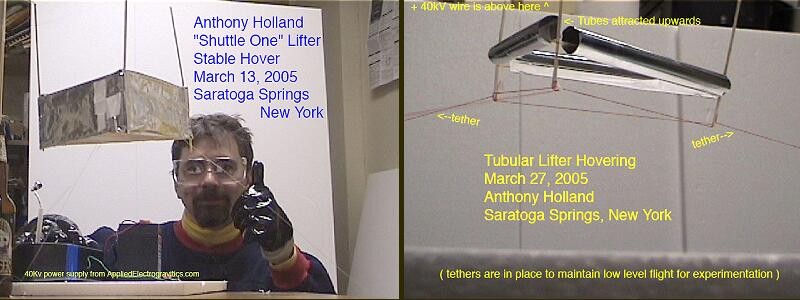
|
|||||||||
| Envoyé via Internet | |||||||||
Hi,
I got my first lifter up and flying, I purchased an HV350
from www.amazing1.com and I used a power converter to convert
120v ac to 12v dc at 5amps to power the HV powersupply.
I followed the instuctions on making the Lifter1. The only thing
that I had to do to the Lifter was to remove some of the Balsa
wood from the top of the supports to reduce it's weight so it
would acheve a stable flight. Everyone is amazed at how it
lifts up and hovers.
I used a cardboard box to hold up the HV+ wire.
I am looking forward to making more lifters and trying some
different designs in the future.
Please put me in your Logbook.
Thanks,
Russ Kuhn
Tucson, Az. USA.
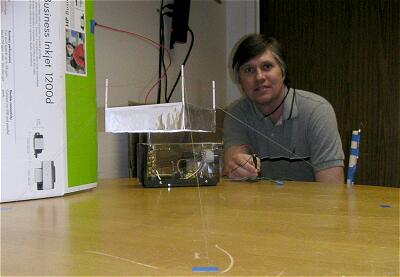
|
|||||||||
| Envoyé via Internet | |||||||||
Hello Jean-Louis,
My name is Harold Berndt and at the beginning of this year... Within days... I had started a research company "Rabbit Hole Research" and I contructed my 1st Lifter (got it off the ground but not very high - 2-3 cm). To date I have probably constructed anywhere from 30 to 40 Lifters of various sizes... configuration... shapes etc... I have been using an old "Motel" TV set which seems to have a little more punch than the computer monitor I started with but I am expecting the delivery of my new High Voltage power supply any day now. I have some very interesting findings and suggestions which I will follow up with and I just joined the Yahoo "Lifters" newsgroup. I am also very close (a couple of miles) from John Hutchison (The Hutchison effect) who lives in New Westminster BC (I'm in Surrey, BC or the Greater Vancouver BC area in Canada). I did contact John who invited me to see his lab in New Westminster... which I'm looking forward to!
Please find attached, a few static images of my Lifters etc... as well as 2 video clips. The video clips are of the same test levitation but one of them I added some cool audio effects as well as adding an "Old time" movie effect... do with these images as you see fit. That's about it for now but I did want to register (one of) my successful levitations.
Kind Regards,
Harold Berndt RABBIT HOLE RESEARCH Ltd. Surrey, BC
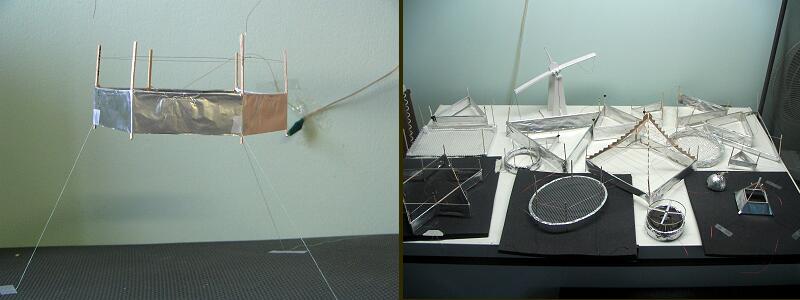
|
|||||||||
| Envoyé via Internet | |||||||||
Il vole enfin !! :)
merci encore,
j'espere que le jury du concours des ecoles d'ingenieur appreciera le sujet :)
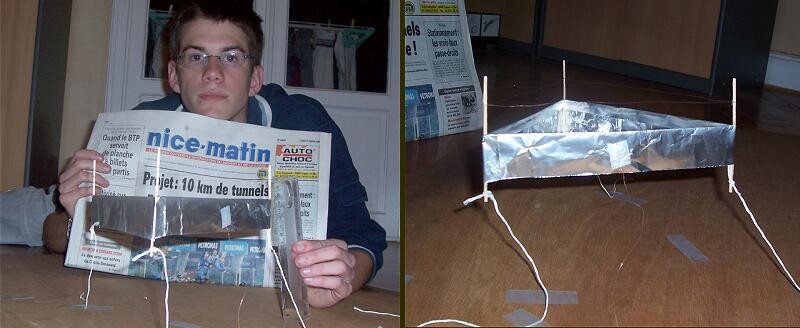
|
|||||||||
| Envoyé via Internet | |||||||||
Bonjour Comme promis, je vous tiens au courant des nouvelles expériences effectuées avec les lifter. J'ai réussi à faire voler un lifter 2 malgré quelques défauts de réalisation. Je vous envoi donc mon meilleur film retraçant le phénomène. Je vous remercie de toute l'aide que vous m'avez apporté
Cordialement
Pierre-Louis Toussaint
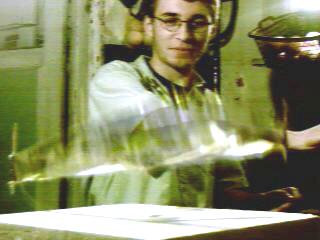
|
|||||||||
| Envoyé via Internet | |||||||||
Hi my name is Daniel Kranich.
I am 12 and live in Anchorage alaska. I have enclosed a picture of our lifter we got to fly. we where able to create a power supply from your schematic, but it has slowly been decreacing in aoutput power.
I did a sience project and got a 2nd place
trophy! (see enclosed pic.)please put us in your log book!!
Thanks,
Daniel Kranich :-)
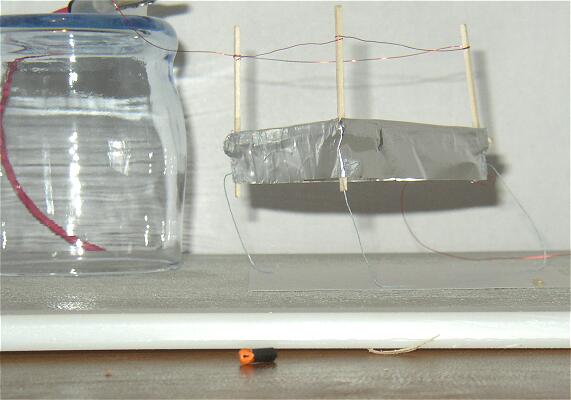
Lifter replications Log Book : Previous Page - Next Page
Return to the Lifters Builders page